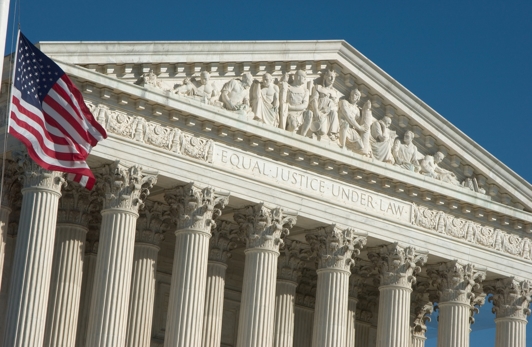
The first federal child pornography regulation was established with the passage of the United States Child Pornography Prevention Act (CPPA) of 1996, out of concern with child abuse manifest on the internet. The federal law was based on a 1982 Supreme Court case which ruled that the First Amendment right to free speech was not violated by a ban on sales of material depicting children in sexual activity.
- The 1996 federal act elaborated on the definition of child pornography.
- Any image (photograph, film, video, picture, or computer-generated image) that appears to be a minor engaging in sexually explicit activity comes under the prohibition.
- Any sexually explicit image that is advertised, promoted or described to convey the impression that it is depicting a minor engaging in explicit sexual conduct is prohibited.
The 1996 CPPA was struck down by the Supreme Court in 2002 as indeed violating the First Amendment to the Constitution, abridging "the freedom to engage in a substantial amount of lawful speech."
- The ruling was brought against the government by a California trade association for the adult-entertainment industry, a publisher of a book advocating nudity and several artists, and photographers who specialized in erotic imagery.
- Many who objected to the law objected to the phrase "appears to be."
- Many felt that drawings or cartoons depicting sexual activity was a "victimless crime."
Current Federal Law.
In 2011, the prohibition of child pornography was brought under the law forbidding the sexual exploitation of children by then-Attorney General, Eric Holder, Jr.
- The justification for the prohibition came from the increased exploitation of children in the production of child pornography.
- Child pornography had become a growth industry in the United States.
- The expansion of internet distribution capability has exacerbated the problem.
- The Child Exploitation and Obscenity Section (CEOS) and the FBI Technology Investigative Unit (HTIU) of the Department of Justice were tasked with investigating and enforcing the child exploitation laws.
Child Pornography Law in California.
Production, possession or distribution of child pornography is illegal in all 50 states. Child pornography depicts a minor engaging in sexually explicit conduct, meaning:
- Sexual acts (bestiality, masturbation, sadomasochism).
- Lewd exhibition of genitals, anus, or pubic area.
- Conduct that creates the appearance of those acts.
- Exhibition of any uncovered portions of the genitals, anus, or pubic areas.
What California law prohibits:
A person is guilty of sexual exploitation of a child when he or she knowingly develops, duplicates, prints, or exchanges any representation of information, data, or image, including, but not limited to, any film, filmstrip, photograph, negative, slide, photocopy, videotape, video laser disc, computer hardware or software, computer floppy disc, data storage media, CD-ROM, or computer-generated equipment or image, which contains or incorporates in any manner any film or filmstrip depicting a person under 18 engaged in an act of sexual conduct.
Defense in Child Pornography Cases.
Child pornography is a serious crime, especially in California where state law goes beyond federal law. It is essential that anyone accused of child pornography charges make contact with a skilled defense attorney. The attorney will work with available defenses to see that any penalty is just.
- If the child pornographic material is found on a computer, especially one that is shared or on a shared network, such a work computer, a disavowal of ownership of the material can be a defense. Cases where people were framed by others who download material and act as informants are not uncommon. The defense attorney can establish this defense by demonstrating how the defendant cannot have downloaded the material.
- Showing the material is not child pornography: that the content does not contain children; that the content is in an exempted category such as categories exempted by the Motion Picture Association of America; showing that the content is devised for an educational or scientific purpose.
- Demonstrating that the materially was accidentally obtained by typographical mistake or an aggressive website that immediately downloads without approvals. The defense lawyer can obtain testimony from experts who can show the limited time the defendant was on a given website.
- Asserting that the seizure of the material was illegal search or that the investigators followed improper methods such as violating the terms of a warrant or entrapment.
- Demonstrating a claim of addiction or psychological dependency may minimize the sentence toward a treatment option.
The Law Office of Nic Cocis has been operating since 1999. Nic Cocis has developed an extensive background in criminal law, having handled several hundred misdemeanor and felony cases ranging from DUI and juvenile matters to domestic violence, white collar crimes, sex crimes and murder.
If you have been arrested for child pornography in Temecula, Menifee, Murrieta, Wildomar, Lake Elsinore, Hemet, Perris, Corona, Winchester or any other surrounding Riverside County city, it's important that you obtain the best representation from an experienced criminal defense attorney. Please contact our law office immediately to schedule a free and confidential consultation. We represent adults and juveniles/minors in all the Riverside County courts.

